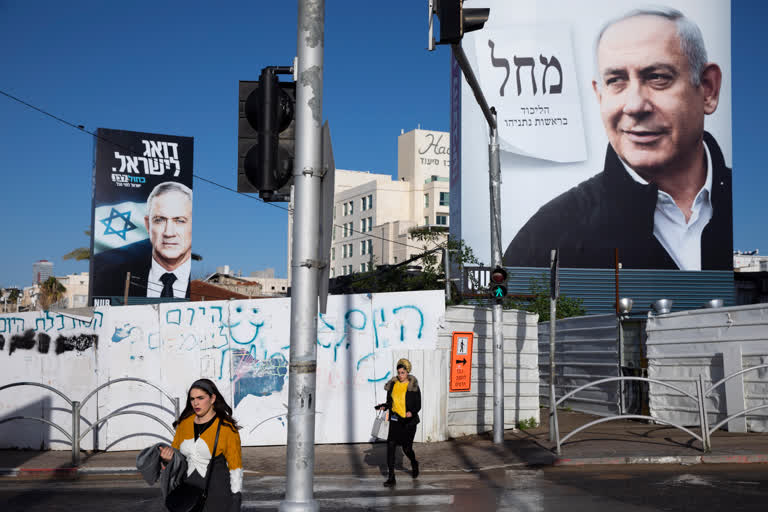Jerusalem: Israelis head to the polls for the third time in less than a year on Monday, after the two previous parliamentary races ended inconclusively.
Twenty-nine parties are running, but no more than eight are likely to break the 3.25% electoral threshold needed to enter the Knesset, Israel's parliament.
Almost 6.5 million eligible voters would cast their ballots in 10,631 ballots across the nation on Monday, according to the Central Elections Committee's figures.
Some 14 special ballots will be established for the use of hundreds of Israelis who are under mandatory self-quarantine for fear they might have been infected with COVID-19, Xinhua reported.
Read also:A look at how Israel's 3rd election in a year could play out
The quarantined voters could cast their votes wearing disposable masks and gloves in ballots that will be placed in tents.
No party has ever won an absolute majority in the 120-seat Knesset. Typically, larger parties have to make alliances with smaller groups to create a governing coalition with a majority in parliament. After the election, the president will tap a party leader to try to form a coalition government.
Read also:Israel, India defence cooperation growing steadily: Israeli Ambassador to India
Monday's election is triggered after neither Prime Minister Benjamin Netanyahu nor his chief challenger Benny Gantz succeeded in building a coalition after September's vote, leading the Knesset to dissolve itself and hold new elections.
Here's a look at the main parties and blocs:
LONG-RULING LIKUD
The conservative Likud party has dominated Israeli politics for much of the past 40 years, with Netanyahu as prime minister for the past decade.
Its election campaign has focused heavily on Netanyahu's leadership and close relationships with world leaders, most importantly US President Donald Trump. Since the White House unveiled its Mideast plan last month, Netanyahu has proposed a key plank in his platform.
Netanyahu has traditionally allied himself with Israel's ultra-Orthodox and religious nationalist parties to form governing coalitions. To garner support from the nationalist right, Netanyahu has promised to take steps toward annexing areas of the West Bank if re-elected.
The prime minister will go to trial two weeks after the elections for his indictment in three corruption cases. He has denied wrongdoing. Netanyahu's legal woes don't appear to have affected Likud's polling numbers.
STUCK IN THE MIDDLE
Gantz's centrist Blue and White party won a seat more than Likud in September and remains poised to challenge for that title again on Monday.
The party's leaders — which include the former army commander Gantz, an ex-TV host and two other retired military chiefs — have focused their campaign on Netanyahu's legal woes and questioned his character.
The party shares similar views to the Likud when it comes to a tough stance against Iran and Palestinian militant groups, but is more open to negotiations over Palestinian statehood. It breaks from Likud more dramatically when it comes to matters of the rule of law. Blue and White calls for a national unity government with Likud, but only if it rids itself of its longtime leader because of the corruption charges against him.
Even if Blue and White bests its long-ruling opponent, it will have a difficult time patching together an alternative governing coalition due to divisions among the anti-Netanyahu forces and the party's reluctance to cooperate with the Arab-led parties in the Knesset.
THE RELIGIOUS NATIONALISTS
